Liberal leadership race in Canada .. rolling update and autopsy on super weekend 2006
Oct 2nd, 2006 | By Counterweights Editors | Category: Ottawa Scene MONDAY, OCTOBER 2, 2006. 10:30 AM. [OCTOBER 3 UPDATE AND RESULTS AS OF OCTOBER 5 ADDED]. With more than 85% of the so-called super-weekend results calculated for convention delegates in the Canadian federal Liberal leadership race, Michael Ignatieff enjoys a tidy if far from overwhelming lead. Bob Rae is in a clear second place, with Gerard Kennedy and Stephane Dion not too far behind. Disappointing numbers for Ken Dryden reduce his chances of finally emerging to win on the nth ballot at the December 2 convention to near-miraculous. From some old-school angles, the former hockey star may still be the best guy to put up against Stephen Harper in the next Canadian federal election. But the members of his reforming party apparently do have higher things on their minds right now.
MONDAY, OCTOBER 2, 2006. 10:30 AM. [OCTOBER 3 UPDATE AND RESULTS AS OF OCTOBER 5 ADDED]. With more than 85% of the so-called super-weekend results calculated for convention delegates in the Canadian federal Liberal leadership race, Michael Ignatieff enjoys a tidy if far from overwhelming lead. Bob Rae is in a clear second place, with Gerard Kennedy and Stephane Dion not too far behind. Disappointing numbers for Ken Dryden reduce his chances of finally emerging to win on the nth ballot at the December 2 convention to near-miraculous. From some old-school angles, the former hockey star may still be the best guy to put up against Stephen Harper in the next Canadian federal election. But the members of his reforming party apparently do have higher things on their minds right now.
Quick overview of the numbers …
So far, 29.9% of the local riding delegates selected at large for the Montreal convention some two months from now are committed to Michael Ignatieff on the first ballot, with the others still in the race behind him as follows:
DELEGATE FIRST BALLOT PREFERENCES AS OF 2:00 PM, OCTOBER 5
Michael Ignatieff | 29.9 |
Bob Rae | 19.8 |
Gerard Kennedy | 16.8 |
Stephane Dion | 16.5 |
Ken Dryden | 4.6 |
Joe Volpe | 4.6 |
Scott Brison | 4.0 |
Martha Hall Findlay | 1.0 |
UNDECLARED DELEGATES | 2.8 |
SOURCE: Liberal Party of Canada
It is worth bearing in mind that these results could change somewhat as additional delegates are selected. (And the counterweights editors will be updating the table above as fresh results become available). The broader picture from here is summarized nicely on the CTV News Net website:
This past weekend, and on into the present week of October 2-6 apparently, “about 4,300 delegates” are being selected by Liberal Party of Canada members “in every one of the 308 ridings in the country to attend the leadership convention in Montreal from Nov. 28 to Dec. 3 … There are also ex-officio delegates” to the convention, “such as MPs, provincial politicians and party officials who comprise about another 1,000 votes …
“Delegates are elected to attend the conference in order to vote for a specific candidate on the first ballot, but on subsequent ballots they are free to vote for the candidate of their choice.”
Will the Liberals really be crazy enough to choose Michael Ignatieff in the end ?
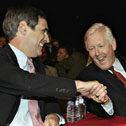 It no doubt says something about the Liberal Party of Canada in the fall of the year 2006 that a candidate like Michael Ignatieff has proved to be to be the clear (if far from impregnable) front runner in the super-weekend round of delegate selection for the Montreal convention.
It no doubt says something about the Liberal Party of Canada in the fall of the year 2006 that a candidate like Michael Ignatieff has proved to be to be the clear (if far from impregnable) front runner in the super-weekend round of delegate selection for the Montreal convention.
It would certainly be wrong to say that Mr. Ignatieff is not really a Canadian, insofar as anyone cares to qualify for such a designation these days. He was born in Toronto, in 1947, and received his early education at Upper Canada College there, and then at the University of Toronto. And he apparently taught for a time at the University of British Columbia too.
His father was an eminent Canadian diplomat. Since his youth Michael Ignatieff himself has been good friends with the second-place candidate in the Liberal leadership race at the moment, Bob Rae – the former, how to put it, controversial first New Democratic premier of Canada’s most populous province of Ontario (19901995).
Yet in his quest for the Liberal leadership, it is both Michael Ignatieff’s main attraction and his Achilles heel that he is such a textbook case of the local boy who wins great renown in at least some parts of Canada for making good abroad.
WHAT IF SOMEONE LIKE MICHAEL IGNATIEFF WERE RUNNING FOR PRESIDENT OF THE USA? As a Wikpiedia bio with a “neutrality contested” label attached points out: “Ignatieff was based in the United Kingdom from 1978 to 2000. During this time he was on the faculty at both Cambridge and Oxford Universities and worked as a film-maker and political commentator for the BBC. He lived in the United States from 2000 to 2005 where he was director of Harvard’s Carr Center for Human Rights Policy. He returned to Canada in 2005 to take a position at the University of Toronto and enter politics.”
I.e., for most of the past quarter-century or so Michael Ignatieff has not actually been living in Canada. And, on the main attraction side, good for him, some or even many Canadians will say.
There have always been good Canadians who spent the bulk of their adult lives in the United Kingdom and/or the United States, where they became seriously well known in their fields. And Canadians have always been proud to claim them as their own when it suited Canadian purposes. As Paul Wells pointed out in a recent column in Maclean’s magazine, in some Canadian places in the fall of 2006 it is parochial, and certainly un-cosmopolitan, to draw any undue attention to Mr. Ignatief’s prolonged absence from Canada, from 1978 to 2005.
On the other hand, on the side of the Achilles heel, imagine a born-in-the-USA candidate for the office of President of the United States who had spent most of the past quarter-century or so living in the United Kingdom (or France or Italy, say, or even Canada itself, or Australia, South Africa, etc.) What chance would you give this candidate – especially if he or she were facing an opponent who had spent all of the past quarter-century or so living right in the good old USA where he or she belonged, and chose to live, etc., etc?
CANADA IS STILL NOT ALL THAT COSMOPOLITAN AT ITS GRASS ROOTS. Mr. Ignatieff’s most ardent supporters may say: exactly, that is the point. Canada is not a country like the United States, and ain’t that grand! That is what makes Michael Ignatieff such an inspiring candidate for leader of the Liberal Party of Canada in the age of global village, etc.
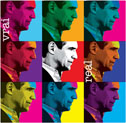 However, as even Homer Simpson can appreciate, when you get down to the depths of its grass roots, Canada (and especially English-speaking Canada) actually is, in broad comparative perspective, an America Junior. Of course, it is not always or even often possible. Yet in the privacy of the ballot box perhaps most Canadian voters will finally try to pretend that their country is just as important to them as the USA today is to the elephant next door.
However, as even Homer Simpson can appreciate, when you get down to the depths of its grass roots, Canada (and especially English-speaking Canada) actually is, in broad comparative perspective, an America Junior. Of course, it is not always or even often possible. Yet in the privacy of the ballot box perhaps most Canadian voters will finally try to pretend that their country is just as important to them as the USA today is to the elephant next door.
Like what is still a majority of Canadian voters, Stephen Harper has been here all along. And who among the 70% of newly selected Liberal delegates not committed to support Mr. Ignatieff on the first ballot, on December 2, will fail to have some opportunity over the next two months to imagine just how well his long absence from his home and native land will finally play against the record of Mr. Harper? (Who was also born in Toronto, but received his higher education at the University of Calgary in oil-rich Alberta.)
To think such things may be parochial. And it is certainly not cosmopolitan. But it is political realism in the Canadian democracy today, say whatever else you like. It is not altogether inconceivable that Michael Ignatieff might become prime minister of Canada in the next federal election, or perhaps the one after that. But in a number of respects it would be a quite remarkable event even in Canadian political history if he did. Name one other Canadian prime minister who has had quite his kind of extended expatriate career outside Canada.
INITIAL SUPPORT FOR WAR IN IRAQ AND LACK OF PRACTICAL EXPERIENCE IN ORDINARY GOVERNMENT AND POLITICS. Then there is the point that, unlike almost certainly at least a bare majority of Liberal Party of Canada members today, Michael Ignatieff actually supported the US war in Iraq when it first started in 2003. He can claim to have seen the error of this judgment earlier than many others who took a similar position. But just listen to him explaining his newfound wisdom in March 2004, in the pages of the New York Times magazine:
“My second thoughts begin with the debate last year. We thought we were arguing about Iraq, but what might be best for 25 million Iraqis didn’t figure very much in the argument. As usual we were talking about ourselves: what America is and how to use its frightening power in the world.”
(Again this was before Mr. Ignatieff returned to Canada in 2005, to get involved in Canadian politics. At this point, when he wrote that as “usual we were talking about ourselves,” he was presumably still thinking of himself as an American first. And that is again likely enough to become some kind of political problem for him in, say, a Canadian federal election in 2007.)
And then there is the question of just what kind of practical experience Michael Ignatieff has actually had as a political leader.
He is without doubt an impressive “world-class” public intellectual, who has, e.g., written an internationally admired biography of the British political philosopher Isaiah Berlin. He definitely has what William Buckley has called “gravitas,” and he has obvious policy weight and heft in public debate.
But he has had very little to do in his career so far with the ordinary nuts and bolts of government and politics – and with the thorny realities of turning policy ideas into practical government action, in any of the countries in which he has spent the past three decades of his life.
THE GHOST OF PIERRE TRUDEAU. The remarkable and unusual Canadian legend of Pierre Trudeau has left some factions of the Liberal Party of Canada today with a continuing thirst for visionary intellectuals in politics. In some respects Mr. Ignatieff seems to play to this thirst. It impressed some parts of the rising global village of the 1960s, 1970s, and 1980s that Canada had a prime minister like Trudeau. Mr. Ignatieff might be able to rekindle that kind of international image for the country again, etc.
 Yet for all his youthful travel abroad, and sojourns at major universities in the United States, France, and the United Kingdom, Trudeau was not really the kind of expatriate international public intellectual that Michael Ignatieff is. Before he moved to Ottawa Trudeau lived mostly at his family home in Montreal. The main subject of most of what he wrote about before he became prime minister of Canada was Canada itself.
Yet for all his youthful travel abroad, and sojourns at major universities in the United States, France, and the United Kingdom, Trudeau was not really the kind of expatriate international public intellectual that Michael Ignatieff is. Before he moved to Ottawa Trudeau lived mostly at his family home in Montreal. The main subject of most of what he wrote about before he became prime minister of Canada was Canada itself.
Mr. Ignatieff has not really written anything about the problems and opportunities of Canada today. Until quite recently Canada and its political fate has not been one of his subjects. It is even unclear how much he really understands about what has been happening in Canada since the late 1970s. Whatever else you might say about him, everyone paying attention knew that Pierre Trudeau was passionately concerned about Canada’s future. Michael Ignatieff’s resume is much more open to the perception that he has been mostly passionately concerned about Michael Ignatieff’s future.
Mr. Ignatieff has certainly added some distinction and perhaps even elevation to the 2006 Canadian federal Liberal leadership race. It seems more than likely that he would make a distinguished addition to any federal Liberal cabinet that fate and fortune may or may not have in store for the short to mid term Ottawa future. He is now the unambiguous front runner in the current party leadership race.
But it still at least rather clearly seems to remain as true as it was six months ago that the Liberal Party of Canada would be taking a quite enormous risk if it finally did choose to make him party leader on December 2, 2006.
The Conservatives have lately been putting it about that Michael Ignatieff is the prospective Liberal leader they most fear facing in the next Canadian federal election. And it may even be true that he is the candidate with the greatest potential for nibbling a bit at certain current clusters of Conservative electoral support. Yet when you think of him up against the all-Canadian boy Stephen Harper, in perhaps most of the 308 federal ridings in the country today, it remains all too easy to see Harper looking just “more Canadian” enough to count in the end. And, considering everything else to date, that would be a nice feat for Mr. Harper. And, still more to the point, any political party that seriously takes advice about its leadership from its main opponents is probably not going to do all that well in the next election, whenever it finally comes.
Reviewing the super-weekend numbers by province … (while looking for clues about who’s really going to win in the end) …
One interesting feature of the “Super Weekend Unofficial Delegate Election Results Ticker” on the Liberal Party of Canada website allows you to conveniently check and update the results for each candidate by province, as well as for Canada from coast to coast to coast.
This kind of exercise may also shed at least a little light on what the counterweights editors see as the most poignant question to emerge from the super weekend: If Michael Ignatieff is not finally going to win a majority of delegate votes on December 2, who is? Moving from the most to the least populous province, here is one version of what the super-weekend results for each province suggest, as of around noon on October 2:
ONTARIO: “Iggy” is currently running at about 27.9% of the delegates’ first ballot votes in Canada’s most populous province, followed quite closely by Kennedy at 26.8%. Rae has 17%, followed by Dion with about 10%, and Dryden at 5.5%. A rash person might say that all this suggests Gerard Kennedy will finally emerge as the new federal Liberal leader on December 2, or some time not too long after.
QUEBEC: Iggy has 37.6% of the delegates in Quebec. (His French is quite good, among other things.) He is followed here by Dion at 29.3%, and Rae at 23.4%. This, you might say, suggests that Stephane Dion is a kind of Quebec favourite-son candidate in the penalty box, and this casts some doubt on Dion’s prospects as the ultimate winner. (On the other hand, it might also make you wonder if former Ontario provincial education minister Gerard Kennedy, whose French is still appalling, isn’t really just an Ontario favourite-son candidate.)
BRITISH COLUMBIA: It makes quite a lot of sense that Bob Rae is the front runner in BC, with 29.2% of that province’s delegates so far. But note too that he is followed here by Kennedy (20.8%), Dion (18.4%), and Ignatieff (17.1%). Iggy’s weakness on Canada’s Pacific Coast, you might urge, starts to show the ultimate cracks in his armor that are bound to widen over the next few months. And then, perhaps, the most interesting point may be that here Kennedy is in second place again, as in Ontario?
ALBERTA: It probably must say something about something that Kennedy (27.8%) is so far actually managing to out-poll Iggy (24.7%) as the front runner in Stephen Harper’s current oil-rich home province. Here the followers are Dion (17.9%), Volpe (9.4%), and Rae (9.0%). So chalk up another Tarot card for Gerard Kennedy? (This is the guy that Liberals who have to put up with Mr. Harper in his home province put first, by a few percentage points anyway.)
MANITOBA: Manitobans will often enough tell you that they see themselves as in the middle of the country in almost all conceivable respects. If this also means that they are good market-research barometers of ultimate cross-Canada trends, then Bob Rae can take heart. Here as in BC he is the front runner (31.5%), followed by Iggy (23.5%), Dryden (14.8%), and Kennedy (14.2%). All this might also make a few people think that hockey star Ken Dryden’s current near-miraculous chances of finally doing anything on December 2 are still not quite yet at zero.
SASKATCHEWAN: Iggy currently has 33.2% of the Saskatchewan delegates, followed by Rae (21.5%), Kennedy (18.5% ), and Dion (15.6% ). In a great Canadian fence-sitting style not always honoured by the birthplace of Agrarian Socialism in North America, this would seem to suggest a kind of maybe Rae/maybe Kennedy scenario for December 2.
NOVA SCOTIA: Scott Brison is clearly the favourite-son candidate in his home province on the sea-bound coast of Atlantic Canada, with an impressive 39.9% of the delegates here. (And the fact that Brison is also the cross-Canada gay community’s unofficial representative in the Liberal leadership race shows just how the old Nova Scotia home is just not quite what it used to be these days – along with Trailer Park Boys and so forth, on and on.) Iggy nonetheless currently has an also impressive enough 37.2% of the Nova Scotia delegates, followed by Dion (9.3%), Dryden (6.0%), and Kennedy (4.4%). A few again might see all this as another very slender ray of light for the official hockey star in the race.
NEW BRUNSWICK: Canada’s only officially bilingual province is currently giving 34.2% of its delegates to Iggy, followed by 14.6% each for Rae and Dion, and 9.5% each for Kennedy, Brison, and Dryden. This is in the grand Canadian Liberal tradition of hedging your bets massively, and would almost seem to have no current predictive value for December 2 – though supporters of Bob Rae and conceivably even Ken Dryden might think otherwise.
NEWFOUNDLAND AND LABRADOR: The legendary Rock in the Atlantic Ocean where so much modern history began makes the third province (along with BC and Manitoba) where Bob Rae is currently in first place, at 33.3% – followed by Iggy (30.6%), Dryden (14.8%), and Kennedy (10.2%). Bob Rae supporters might logically enough make quite a lot of all this. (And again Atlantic Canada and Manitoba are apparently the two places where Ken Dryden is still breathing, sort of.)
PRINCE EDWARD ISLAND: Canada’s least populous province finally makes the fourth such (in some ways at least) equal sovereign jurisdiction where (and with all of the vote now counted in this case) Bob Rae is in the super-weekend lead, with a striking 43.1% of delegates at the moment. He is most notably followed by Kennedy (21.5%) and Iggy (20.0%).
Summing it all up right now …
So where does all this get you in the end?
A prudent person will still make some allowance for the possibility that the Liberal Party of Canada, at the current juncture in its long and not altogether noble history, just might be crazy enough to actually elect Michael Igantieff as its leader. In the opinion of the counterweights editors they would be making a great mistake. But so what, many actual delegates to the convention in Montreal some two months hence might quite reasonably say?
Assuming, however, that all the assembled voting delegates do not prove quite so crazy on December 2, the obvious enough best guess at the moment is that either Bob Rae or Gerard Kennedy will finally win. On super weekend Kennedy seems to have done somewhat better in the more populous provinces, and Rae in the less populous provinces. Kennedy’s one great problem is still his very inept French. The heavy chain around Bob Rae’s neck is still his chequered career as the first New Democratic premier of Ontario.
Stephane Dion and (much, much less likely of course) perhaps even Ken Dryden may still have some vague dark-horse potential. Dion seems to have agreeably surprised many anglophone Canadians actually paying attention. But the very heavy chain around his neck is still the quite massive extent to which Quebec has had much more than its fair share of Canadian prime ministers since the late 1960s. (M. Dion does seem to appreciate this. And he has honourably made clear that whatever happens he will impressively remain on whatever kind of federal Liberal team the Canadian people may choose to empower or otherwise elect in any near future.)
Ken Dryden has not really done at all well enough on super weekend to give him much of a future over the next two months. Only such things as a few opinion polls showing the former hockey-star political philosopher from the Greater Toronto Area with much greater support among ordinary Canadian voters than he currently has among Liberal Party members could do anything to improve his situation now.
In any case, on the very bottom line this remains quite a horse race – with three or four candidates still holding some serious cards. Who knows what might happen over the next two months? Yet, as matters stand, it will be very interesting to see who finally does get the nod early this coming December, in beautiful old downtown Montreal …
OCTOBER 3 UPDATE: Campbell Clark at the Globe and Mail has reported that the Liberal leadership campaign is now off on a new phase – “as the top four contenders began wooing supporters from other camps and prepared for sharper, more personal attacks in the eight weeks before the convention.”
Clark urges that “Mr. Rae, who has about 20 per cent of the delegates, and Mr. Kennedy and Mr. Dion, each with about 17 per cent, can still hope to beat” frontrunner Michael Ignatieff “at the convention, but they must gain more ground … Mr. Dion is seen by many as perhaps the most likely to emerge as Mr. Ignatieff’s chief rival after Mr. Kennedy was nearly shut out in Quebec and Mr. Rae was a distant third in Ontario, where he was NDP premier from 1990 to 1995.”
The counterweights editors just note that, as of around noon today, the Super Weekend Unofficial Delegate Election Results Ticker on the Liberal Party website is giving the following numbers of delegates for Rae, Dion, and Kennedy in the four most populous provinces:
Cand | ONT | QUE | O&Q | BC | AB | BC&AB |
Rae | 241 | 251 | 492 | 111 | 37 | 148 |
Dion | 146 | 314 | 460 | 70 | 74 | 144 |
Kennedy | 380 | 18 | 398 | 79 | 115 | 194 |
On these numbers, Rae actually does somewhat better in Ontario and Quebec combined than Dion (while still doing quite respectably in Quebec and better than Dion in Ontario). Kennedy is no doubt dramatically off the mark in Quebec, but does better than either Rae or Dion in BC and Alberta combined.
The counterweights editors are also still guessing that, as noted below, the dramatic over-representation of Canadian prime ministers from Quebec since the late 1960s is finally going to make it very difficult (though certainly not altogether impossible, no doubt) for the federal Liberals to select yet another party leader from Quebec.
Finally, though it almost certainly is a virtually dead horse, of course, if we were Ken Dryden, we wouldn’t quite drop out of the race just yet. Wait and see what the next poll about support for all the current candidates among the wider electorate might show, at least … .
Earlier report from September 18: LIBERAL LEADERSHIP .. O Ken Dryden .. Ignatieff and Quebec .. Vancouver debates .. bet on Bob Rae?
 UPDATED SEPTEMBER 25. The Canadian House of Commons returned to work on Monday, September 18. But the most intriguing current events in Canadian federal politics do not involve the Conservative minority government’s parliamentary agenda. The Liberal leadership race, e.g., has now dwindled to nine contestants (and still more recently only eight). After the September 17 “debates” in Vancouver, an update mood is in the air. Journalist Jeffrey Simpson has offered a tough assessment of Michael Ignatieff’s proposal “that the national status’ of Quebec eventually be enshrined in the Constitution.” But the big news is that Ken Dryden seems to be the dark horse almost no one is talking about, yet. (Though the very latest poll of Liberal Party members alone still suggests that Mr. Ignatieff, Stephane Dion, and especially Bob Rae are still the leading candidates, with Mr. Dryden and Gerard Kennedy still in the wings.)
UPDATED SEPTEMBER 25. The Canadian House of Commons returned to work on Monday, September 18. But the most intriguing current events in Canadian federal politics do not involve the Conservative minority government’s parliamentary agenda. The Liberal leadership race, e.g., has now dwindled to nine contestants (and still more recently only eight). After the September 17 “debates” in Vancouver, an update mood is in the air. Journalist Jeffrey Simpson has offered a tough assessment of Michael Ignatieff’s proposal “that the national status’ of Quebec eventually be enshrined in the Constitution.” But the big news is that Ken Dryden seems to be the dark horse almost no one is talking about, yet. (Though the very latest poll of Liberal Party members alone still suggests that Mr. Ignatieff, Stephane Dion, and especially Bob Rae are still the leading candidates, with Mr. Dryden and Gerard Kennedy still in the wings.)
Footnote on Parliament … Afghanistan, climate change, long gun registry, softwood lumber, and what else … ?Very quickly, are there any even mild parliamentary hi-jinks ahead, to suitably amuse and educate we the Canadian people this fall?
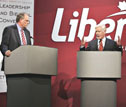 Some say, e.g., that the Harper government’s softwood lumber trade deal with the US – officially signed in Ottawa at last this past week – could start its adventures in the parliamentary approval process as early as September 19. But it already seems that the Bloc Quebecois will be making sure the government’s bill gets through. So where’s the beef here?
Some say, e.g., that the Harper government’s softwood lumber trade deal with the US – officially signed in Ottawa at last this past week – could start its adventures in the parliamentary approval process as early as September 19. But it already seems that the Bloc Quebecois will be making sure the government’s bill gets through. So where’s the beef here?
The recent tragic and senseless shooting at Dawson College in Montreal has raised the fate of the old Liberal government long gun registry yet again. And Jack Layton’s NDP has already signaled its intention to press for some kind of further debate on Canada’s continuing involvement in Afghanistan. Neither of these issues seems likely to bring the government down, however, or otherwise provoke profoundly memorable moments in the Canadian House of Commons.
What else? Who knows? Some say climate change and the Kyoto Accord. But where can this really go at the moment? It now at least seems most likely that there will be no ultimate excitement of yet another federal election until the Liberal leadership race finally comes up with a winner, early in December. Then things might start to get more deadly and interesting again.
Ken Dryden in the September 14 Gandalf Group Poll …
The most provocative recent intelligence on the Liberal leadership race has been a September 14 poll report from something called the Gandalf Group. And while the report rightly stresses that Canada-wide popular opinion on the now nine candidates is still quite soft and malleable, it does reveal one striking piece of news. Ken Dryden – former star goalie for the Montreal Canadiens hockey club and current Liberal MP for York Centre in Ontario – is at the moment the candidate with the greatest support among ordinary Canadian voters. (Well, by a little bit anyway … and for the somewhat different very latest supplementary estimates among Liberal Party members alone, see SEPTEMBER 20 UPDATE below.)
SEPTEMBER 14 GANDALF GROUP POLL
Candidate | % National | % Liberal supporters |
Ken Dryden | 19 | 19 |
Bob Rae | 17 | 19 |
Michael Ignatieff | 10 | 12 |
Stephane Dion | 8 | 8 |
Gerard Kennedy | 4 | 7 |
Scott Brison | 3 | 4 |
Martha Hall Findlay | 2 | 1 |
Hedy Fry | 1 | 1 |
Joe Volpe | 1 | 1 |
Don’t know/Refused/other | 35 | 28 |
SOURCE: Canda News Wire.
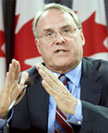 This is as striking as it is because the conventional wisdom of the Ottawa political literati up to now has not even put Dryden among the four or five top contenders. Contrary to the chart above, e.g., somewhat less recent press reports have ranked him below Gerard Kennedy, and sometimes even below Scott Brison too.
This is as striking as it is because the conventional wisdom of the Ottawa political literati up to now has not even put Dryden among the four or five top contenders. Contrary to the chart above, e.g., somewhat less recent press reports have ranked him below Gerard Kennedy, and sometimes even below Scott Brison too.
It is easy enough of course to say that Ken Dryden’s hockey career has just given him better name recognition among the great unwashed than anyone else, for the time being. But when you start pondering even the sometimes scanty intelligence that has appeared on him over the past several months, it is not all that difficult to picture Dryden as arguably the best thing the Liberals could put up against Stephen Harper in the end (and Jack Layton, if not Gilles Duceppe).
Ken Dryden, former prize goalie of the most legendary team in hockey, from Quebec, is “a star who hates to lose,” a man with a “vision for big Canada’,” and a “writer, educator, thinker and idealist,” who wears the “flag on his sleeve.”
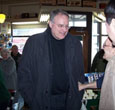 He may be slow-and-steady-wins-the-race. He may be wise to surround himself with energetic seasoned administrators if he ever does become prime minister. But, more crucially, he seems to have populist cahones, or whatever they are, and forward-looking thoughts.
He may be slow-and-steady-wins-the-race. He may be wise to surround himself with energetic seasoned administrators if he ever does become prime minister. But, more crucially, he seems to have populist cahones, or whatever they are, and forward-looking thoughts.
(Last spring, e.g., he quietly let it be known that, like former Liberal finance minister John Manley, he sees how the age of the British monarchy in Canada is now altogether over at last. And he is almost ready to actually do something about it.)
One reason for what many observers still see as Dryden’s lackluster performance in the race inside the party itself may be that he just does not appeal to an important stream of Liberal activism – that is not quite so influential among the Canadian people at large. For this side of the party the leading candidates are Michael Ignatieff, Bob Rae, and Stephane Dion, with Gerard Kennedy and (the openly gay Atlantic Canadian) Scott Brison nipping at their heels.
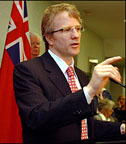 It is of course the Liberal Party of Canada and not the Canadian people who will finally choose a new leader on December 2, 2006. And political parties sometimes make big mistakes when they pick their leaders. Some would say that Gerard Kennedy and not Ken Dryden will prove the best or at least most likely compromise alternative to any of the more philosophically heavyweight but finally not quite practicable options of Ignatieff, Rae, and Dion – when push comes to shove and candidates start dropping like flies after the first few votes on the convention floor.
It is of course the Liberal Party of Canada and not the Canadian people who will finally choose a new leader on December 2, 2006. And political parties sometimes make big mistakes when they pick their leaders. Some would say that Gerard Kennedy and not Ken Dryden will prove the best or at least most likely compromise alternative to any of the more philosophically heavyweight but finally not quite practicable options of Ignatieff, Rae, and Dion – when push comes to shove and candidates start dropping like flies after the first few votes on the convention floor.
On the other hand, the September 14 Gandalf Group report may be just the first of several subsequent occasions when Ken Dryden surprises everyone but the sports journalists among us. (Some will still say who is the Gandalf Group? But who cares? Their report makes interesting reading in any case.) As things stand, Ken Dryden already does seem to be the interesting dark horse, who is at least worth keeping in mind. He could be the dark horse who finally wins.
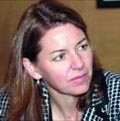 Meanwhile, the journalists who actually have to attend the various official Liberal leadership events still seem to be saying that it’s all a dull circus at best. But Martha Hall Findlay, Hedy Fry, and Joe Volpe are still in the race too. And they are still adding interesting enough forms of colour and credibility for those of us just watching through the mass media from afar.
Meanwhile, the journalists who actually have to attend the various official Liberal leadership events still seem to be saying that it’s all a dull circus at best. But Martha Hall Findlay, Hedy Fry, and Joe Volpe are still in the race too. And they are still adding interesting enough forms of colour and credibility for those of us just watching through the mass media from afar.
Say whatever else you like. This is a political party with aspiring leaders on both the Atlantic and Pacific coasts, from both old and new multicultural communities, from francophone Quebec, from both genders and straight and gay communities, and even from Ontario by way of Manitoba and Alberta first. In their own ways, all the candidates are bright and forward-looking people who care about public institutions and public life.
This does not look like a party that is suddenly going to stop being a major force in Canadian federal politics any time too soon.
Simpson on Ignatieff on Quebec’s national status … but what about going through the side door of the reformed Senate instead?
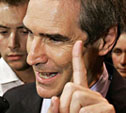 Focusing on what is probably still regarded as the leading triumvirate in the race right now, Jeffrey Simpson of the Globe and Mail began his September 15 column with: “Liberal leadership candidate Michael Ignatieff proposes that the national status’ of Quebec eventually be enshrined in the Constitution. Two serious rivals, Bob Rae and Stphane Dion, disagree. How would Canadians respond?”
Focusing on what is probably still regarded as the leading triumvirate in the race right now, Jeffrey Simpson of the Globe and Mail began his September 15 column with: “Liberal leadership candidate Michael Ignatieff proposes that the national status’ of Quebec eventually be enshrined in the Constitution. Two serious rivals, Bob Rae and Stphane Dion, disagree. How would Canadians respond?”
To make a long story short, Mr. Simpson argues that most Canadians (and certainly Mr. Simpson himself) would finally agree with Mr. Rae and M. Dion. I.e.: “If history be any guide, recognizing Quebec as a nation’ will split the country. Certainly divisions over Quebec as a distinct society’ in the Constitution produced the national psychodrama of Meech Lake, the defeat of which created the Bloc Qubcois, the referendum of 1995, and a structural shift in federal politics, whereby the Bloc is the province’s dominant federal party.”
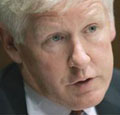 At the same time (and as even Mr. Simpson seems to allow between the lines of his piece), we in the rest of Canada still need to do something about recognizing that while Quebec may and will forever be the most beautiful Canadian province, it is also, as such Quebec leaders as Jacques Parizeau and even Robert Bourassa have long maintained, “not a province like the others.”
At the same time (and as even Mr. Simpson seems to allow between the lines of his piece), we in the rest of Canada still need to do something about recognizing that while Quebec may and will forever be the most beautiful Canadian province, it is also, as such Quebec leaders as Jacques Parizeau and even Robert Bourassa have long maintained, “not a province like the others.”
Just as a quick exercise in thinking outside the box, there does seem at least one obvious enough current alternative to recognizing, in a very general and inevitably rather mysterious and divisive way, that Quebec is a “nation” or “distinct society,” etc. It may sound too wild and crazy at first. But who knows? We live in dark times, as usual. In principle, or even in practice, it may work.
To make a long story short here, at the moment Prime Minister Harper is interested in getting a “step-by-step” process of Canadian Senate reform underway soon enough. Even on the most optimistic assumptions, it would or will take some time before this process ever gets around to reassigning actual Senate seats to various provinces, in some more suitably regionally representative reformed Senate of the future. But just suppose this does finally happen.
So at that juncture, why not just give Quebec more seats than any other province in a reformed Senate – even, say, twice as many seats as any other province? This would be a very clear sign that Quebec is both a province of Canada and not a province like the others.
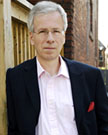 The numbers being what they would be with even just as many as 10 provinces, even twice as many seats as any other province would not really give Quebec any undue influence in the work of the reformed Senate. And meanwhile Quebec’s unique status would be recognized in a very specific way that did not open the kind of unsettling Pandora’s box which so many Canadians outside Quebec do seem to fear in such general things as “national status” and “distinct society.”
The numbers being what they would be with even just as many as 10 provinces, even twice as many seats as any other province would not really give Quebec any undue influence in the work of the reformed Senate. And meanwhile Quebec’s unique status would be recognized in a very specific way that did not open the kind of unsettling Pandora’s box which so many Canadians outside Quebec do seem to fear in such general things as “national status” and “distinct society.”
(Besides, one might say, insofar as it does remain important to recognize that Quebec is, in some respects, a francophone nation as well as a Canadian province, Quebec itself already did this long ago, when it changed the name of its provincial legislature to L’Assemble nationale du Qubec. And this nomenclature has now persisted for more than a generation, with virtually no protest from the rest of the country – even if some in the rest of the country are still not actually aware that there is such a thing as a National Assembly in Quebec today. What is it that we’re supposed to be arguing about in this never-ending great Canadian controversy again?)
The September 17 debates in Vancouver …
At least half the counterweights editors actually in the office board room on Sunday, September 17 managed to stay awake for the televised Liberal leadership debate (or debates) from Vancouver, 35 PM PT. Under separate cover they have submitted the following report:
REALLY JUST A FASHION SHOW
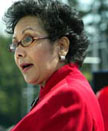 Some would say these events are really political fashion shows rather than debates. As others have complained, the practice of having three candidates on stage at a time, answering different questions, means that you never do get to hear what all nine candidates think on any one question. On the other hand, for most of the questions it probably doesn’t matter.
Some would say these events are really political fashion shows rather than debates. As others have complained, the practice of having three candidates on stage at a time, answering different questions, means that you never do get to hear what all nine candidates think on any one question. On the other hand, for most of the questions it probably doesn’t matter.
As others have earlier complained as well, on many of the questions the candidates do not fundamentally or often even in any other serious way disagree. (As they keep on saying they are all Liberals, after all.) And what you get is three different people at a time, trying to show how well they can attack Stephen Harper’s Conservatives (none of whom are of course present to answer back), on various broad subjects.
(The one brief serious exception, early on in the Vancouver debates, was another clash among the triumvirate of Ignatieff, Rae, and Dion, this time over foreign policy – with special reference to Canada’s role in Afghanistan. But this still seems a rather less provocatively divisive question inside the federal Liberals than some would like it to be.)
SELLING THE CANADIAN STORY
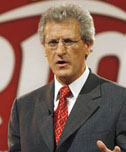 In the midst of all the chatter you do also get a sense that the Liberal Party of Canada 2006 is a voice of and for the “innovative” (and even, some would say, almost wild and crazy?) new Canada that has begun to surface over the past three or four decades. It is a party that likes to say it believes in both a kinder, gentler, and more inclusive and a bolder and more independent Canadian future than Stephen Harper’s new Conservative Party of Canada. And it probably does.
In the midst of all the chatter you do also get a sense that the Liberal Party of Canada 2006 is a voice of and for the “innovative” (and even, some would say, almost wild and crazy?) new Canada that has begun to surface over the past three or four decades. It is a party that likes to say it believes in both a kinder, gentler, and more inclusive and a bolder and more independent Canadian future than Stephen Harper’s new Conservative Party of Canada. And it probably does.
At the same time, there are moments when the fashion show threatens to turn into a regional convention of almost mindless Canada boosters.
Even Hedy Fry at one point had Canada as the rising “Number One” on so many different leading edges of contemporary human endeavor as to make you think you had stumbled into a inspirational seminar for soap salesmen, somewhere on a hip early 21st century reincarnation of Sinclair Lewis’s Main Street. And when Joe Volpe talked about how important it was to “sell the Canadian story,” he seemed to sum this side of things all up.
What alas still seemed recurrently lacking in the unfolding militant narrative was any underlying sense of realism – and just what might actually be done to meet all the tough challenges and take advantage of all the promising new opportunities ahead. Liberals of course might say that realism isn’t really what you want in a leadership race, or even, ideally, an election. That is for when you start the hard work of governing the country after the election, as only you can do.
WHAT DO LIBERALS THINK OF MR. HARPER’S PLANS FOR SENATE REFORM?
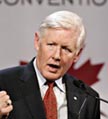 A question very specifically focused on Stephen Harper’s current plans for “step-by-step” Senate reform elicited somewhat more specific pronouncements from the three candidates who walked down this runway – Bob Rae, Gerard Kennedy, and Ken Dryden.
A question very specifically focused on Stephen Harper’s current plans for “step-by-step” Senate reform elicited somewhat more specific pronouncements from the three candidates who walked down this runway – Bob Rae, Gerard Kennedy, and Ken Dryden.
Bob Rae urged that in the end Mr. Harper couldn’t reform the Senate all by himself. Mr. Rae suggested that the issue should be thrown into the lap of the Council of the Federation (i.e. the provincial premiers). If they could come up with a design for a reformed Senate, then OK go ahead. If not, forget it.
Mr. Kennedy essentially agreed. He bowed to the mood for democratic reform more generally, but suggested other reforms would be better. Then Mr. Dryden essentially agreed as well, and added that it was important to focus on the real issues (aboriginal policy, environmental policy, child-care policy, and so forth), and not “mischievous projects of constitutional reform.”
 Bob Rae went on to say that it was important to concentrate on the things that are most important for ordinary people. Gerard Kennedy said he had met few ordinary people who were concerned about Senate reform. It was important to show the West that the federal system can work for everyone. But there were better ways to do this than Senate reform.
Bob Rae went on to say that it was important to concentrate on the things that are most important for ordinary people. Gerard Kennedy said he had met few ordinary people who were concerned about Senate reform. It was important to show the West that the federal system can work for everyone. But there were better ways to do this than Senate reform.
Ken Dryden then offered a note of thoughtful and even heartfelt eastern mysticism. The biggest reform Canada needs now isn’t in the institutions. It’s in the need for the federal government to really connect with the people. It’s finally “not structures but instincts and attitudes” that count.
Others will say, on the other hand, that you can’t really change or otherwise promote instincts and attitudes through direct political action (unless you really do want to start experimenting with George Orwell’s 1984 – and that’s clearly not what Mr. Dryden is talking about). You can only try to change the structures or the institutions, so that the people can be better heard, etc.
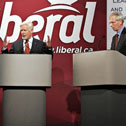 For what it’s worth, all the counterweights editors agree that the federal Liberals are continuing to miss the boat on Senate reform and other such things in the early 21 st century. There remains a pressing enough need for various brands of structural reform in the present Canadian confederation. Realistically, the big and bold new Canada that the Liberals like to talk about so much is not finally going to happen without it.
For what it’s worth, all the counterweights editors agree that the federal Liberals are continuing to miss the boat on Senate reform and other such things in the early 21 st century. There remains a pressing enough need for various brands of structural reform in the present Canadian confederation. Realistically, the big and bold new Canada that the Liberals like to talk about so much is not finally going to happen without it.
The Liberals are continuing to give this issue to the Conservatives (and the Bloc Quebecois). And many ordinary people do have very diffuse and unarticulated but often still quite potent instincts and attitudes about such things. Our guess at the moment at least is that if whoever wins the leadership race on December 2 really does want to beat Stephen Harper in the next election, he or she is somehow going to have to get a little more up to speed on this side of the emerging new Canadian universe too. (Conceivably, say, if Ken Dryden were to grow warmer towards his quiet thoughts on the end of the British monarchy in Canada, that could be a starting point for a fresh and more instinctive Liberal approach to step-by-step structural reform? But at the moment it doesn’t look as if anything at all like this is likely to happen anytime at all too soon.)
CLOSING REMARKS
At the end of things in Vancouver on Sunday, September 17 each of the nine candidates had two minutes to sum up what they are all about. Dr. X has passed along his careful if hasty notes, and we print them intact below – and in the order in which the candidates appeared:
Stephane Dion … wants to keep Canada together “for universal not national reasons” … Quebec and British Columbia working together can be some kind of helpful beacon to the world.
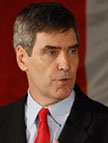 Michael Ignatieff … “We are the party of hope … for all who fear that hope has fled.” [Some would say yes, Hope, Arkansas, but that would be unfair to Mr. Ignatieff.]
Michael Ignatieff … “We are the party of hope … for all who fear that hope has fled.” [Some would say yes, Hope, Arkansas, but that would be unfair to Mr. Ignatieff.]
Bob Rae … just wants to “beat the pants off Stephen Harper” … Liberals were “put in the penalty box in the last election” … choice now really is between a hopelessly narrow and appalling conservative agenda and the good guys.
Gerard Kennedy … a rambling and almost incoherent off-the-cuff talk that nonetheless seemed to stir the crowd, with such phrases as … “renew the party” … “we’re not just a party of power, we’re a party of purpose” … ” [to succeed we must all in this room be] confident that we can afford to support an ambitious Canada” …
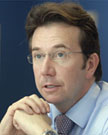 Scott Brison … is in this party because he’s “against Stephen Harper” [i.e. he left Conservatives to join Liberals after Harper became Conservative leader] … Harper is “so far to the right he’s wrong” … Harper “maybe a good governor of the 51st state of the union, but not a good prime minister of Canada” …
Scott Brison … is in this party because he’s “against Stephen Harper” [i.e. he left Conservatives to join Liberals after Harper became Conservative leader] … Harper is “so far to the right he’s wrong” … Harper “maybe a good governor of the 51st state of the union, but not a good prime minister of Canada” …
Joe Volpe … Liberals have a completely different vision from Stephen Harper … time now for deeds instead of thoughts …
Martha Hall Finlay … “We need much more than policy, we need action” … someone like her who is not (yet) a professional politician is the best person to give the party the action it needs …
Ken Dryden … “What do Canadians think?” [i.e. see the latest Gandalf Group poll report above] … a lot’s at stake in the next federal election … “an inclusive, optimistic, big Canada is at stake” … “Who can win the country?” … “ordinary grass-roots Liberals” and others in all parties … “What do Canadians think”? … “Je peut gagner” … [one current liability of Mr. Dryden – he still speaks very bad French, at best].
Hedy Fry … “a woman, an immigrant, and not from the establishment” … lives of ordinary Canadians are finally what is most important … alas some of her supporters cannot afford the $900 to go to Montreal for the big vote in December … there is still much human grief in Canada and the world at large … and it is time to start changing things for the better again.
The next big event in the Liberal leadership race will be the “super weekend” of September 29October 1, when every riding association across Canada picks voting delegates to the leadership convention in Montreal. Then the last “debates” among the leadership candidates will be held in Toronto on Sunday, October 15. The new leader will finally be selected at the Montreal convention on Saturday, December 2. Stay tuned for at least one more counterweights update before then.
SEPTEMBER 20 UPDATE: A new Strategic Counsel poll of only actual federal Liberal Party members presents a somewhat different picture from the Gandalf Group poll of the electorate at large, and self-identified Liberal supporters among the electorate at large:
“Mr. Ignatieff is the first choice of 19 per cent of Liberals surveyed, with Mr. Rae running a tight second at 17 per cent and Mr. Dion just behind with 13 per cent. Gerard Kennedy and Ken Dryden – with 9 per cent each – are tied for fourth. Scott Brison garnered 3 per cent of the vote and Joe Volpe 2 per cent, while Martha Hall Findlay got 1 per cent and Hedy Fry less than 1 per cent.”
When calculations regarding second choices and so forth are factored in: “This is really now a three-man race with two guys who are kind of contenders – Kennedy and Dryden – and a bunch of other people who really should get out of the race because they’re going to humiliate themselves,” said Allan Gregg, chairman of the Strategic Counsel … It’s going to be a long night,’ he said of the convention vote. ‘But if you had to put money on it, you’d bet Rae right now.'”
Whether the Liberal members polled here constitute any random sample of the actual convention delegates who will be chosen over the weekend of September 29October 1 still seems unclear. And once these delegates have been chosen there will still be two months to go before the actual long night at the convention. So the most prudent advice is still probably not to put any money on anything quite yet.
SEPTEMBER 25 UPDATE: Yet another poll of Liberal Party members published in today’s Toronto Star suggests that Bob Rae is the best bet at the moment.
Ignatieff still looks good on the first ballot at the convention, but not beyond. He has now also bumped into some at least minor scandal over such things as signing up deceased Liberal Party members as supporters. Stephane Dion is very strong in Quebec, and still has some depth elsewhere. Kennedy and Dryden are still both said to be dark horses, with some potential to grow suddenly after the first and perhaps second ballots.
Meanwhile, Hedy Fry has now dropped out of the race and thrown her support to Bob Rae. Her cause was no doubt hopeless from the start but good for the party. Whatever else you want to say about her, she remains an asset to Canadian federal politics.
Minor membership recruitment scandals are said to be placing some pressure on Joe Volpe to leave the race too. Whatever he decides, his candidacy has also been good for the party, and he also remains an asset on the wider federal scene. Good Liberals will at least argue with some reason that both Ms. Fry and Mr. Volpe show how their party still has a kind of depth in the cross-Canada social fabric that none of its rivals can altogether match.
